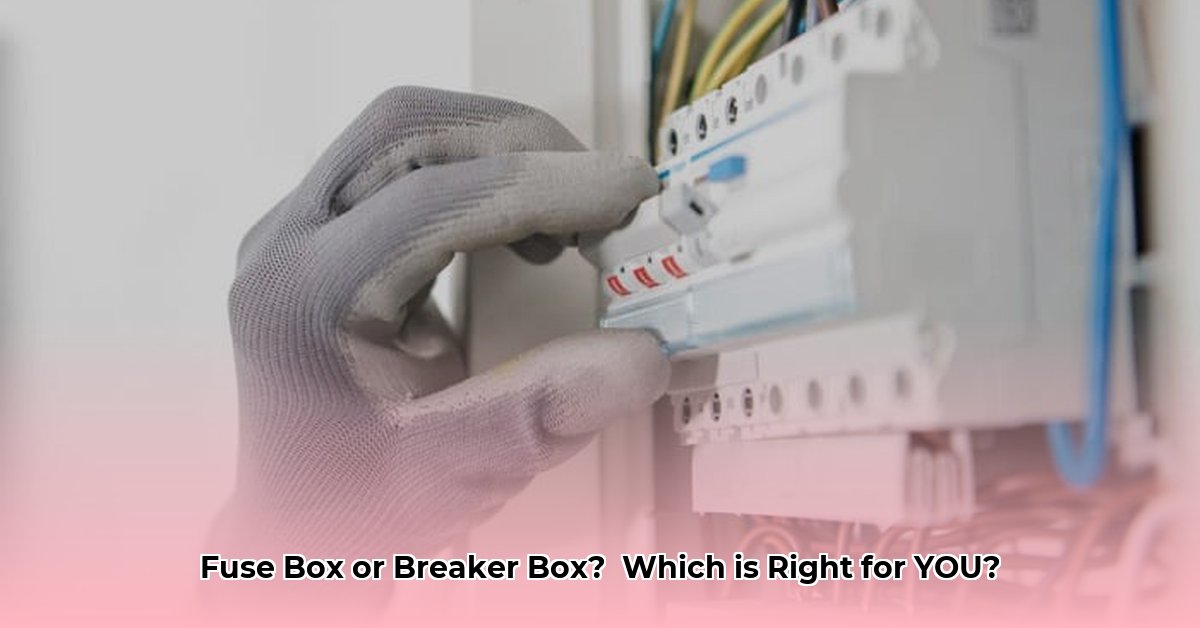This guide provides a comprehensive comparison of fuse boxes and breaker boxes, explaining how they work, their pros and cons, cost considerations, and when upgrading is a smart move. We’ll use clear, easy-to-understand language to empower you to make informed decisions about your home’s electrical safety.
Understanding the Basics: Fuse Boxes vs. Breaker Boxes
Both fuse boxes and breaker boxes serve as the central hub of your home’s electrical system, protecting your wiring and appliances from overloads and short circuits. They act as safeguards, preventing damage and ensuring the safe flow of electricity throughout your home. However, they achieve this protection through different mechanisms.
Head-to-Head Comparison: Fuse Box vs. Breaker Box
| Feature | Fuse Box | Breaker Box |
|---|---|---|
| Overload Protection | Blows a fuse (requires replacement) | Trips a breaker (simply reset) |
| Resetting | Replace the blown fuse | Flip the breaker switch back on |
| Initial Cost | Lower | Higher |
| Long-Term Cost | Potentially higher (fuse replacements) | Lower |
| Safety | Basic overload protection | Advanced safety features (GFCI, AFCI) |
| Convenience | Less convenient | More convenient |
| Future-Proofing | Limited | Excellent |
Delving Deeper: Fuse Box Functionality and Limitations
A fuse box contains a series of fuses, each protecting a specific electrical circuit in your home. Inside each fuse is a thin metal wire designed to melt when the current flowing through it exceeds a safe level. This melting action breaks the circuit, stopping the flow of electricity and preventing damage.
How a Fuse Box Works (with diagram)
[Insert Diagram of Fuse Box and Fuse Here]
A fuse functions like a sacrificial component. When it blows, it must be replaced with a new one of the same amperage rating. This can be inconvenient, especially if you don’t have spare fuses readily available.
Limitations of Fuse Boxes
Fuse boxes offer basic overload protection but lack the advanced safety features of modern breaker boxes. They are also less convenient, requiring manual replacement of blown fuses, and may not be able to handle the electrical demands of modern homes with numerous appliances and electronic devices. Older fuse boxes may lack adequate protection against ground faults and arc faults, potentially increasing the risk of electrical hazards.
Exploring Breaker Boxes: Modern Electrical Protection
Breaker boxes utilize reusable circuit breakers instead of single-use fuses. Each breaker contains an internal switch that trips when the current exceeds a safe limit. Resetting a tripped breaker is as simple as flipping the switch back on.
How a Breaker Box Works (with diagram)
[Insert Diagram of Breaker Box and Breaker Here]
Advantages of Breaker Boxes
Modern breaker boxes often include GFCI (Ground Fault Circuit Interrupter) and AFCI (Arc Fault Circuit Interrupter) breakers for enhanced safety. GFCIs protect against electrical shocks, while AFCIs detect dangerous arcing that can cause fires. Breaker boxes are more convenient, handle higher electrical loads, and offer better protection than fuse boxes. Recent advancements include smart breakers that allow for remote control and energy monitoring.
Cost Considerations: Fuse Box vs. Breaker Box
While fuse boxes have a lower initial cost, the expense of replacing fuses can add up over time. Breaker boxes have a higher upfront cost but offer long-term savings due to the reusability of breakers.
- Fuse Replacement Cost: $1-$5 per fuse
- Breaker Box Installation Cost: $2,000 – $4,500 (professional installation recommended)
- Upgrading from Fuse Box to Breaker Box: $2,000 – $4,500 (depending on the size of your home and complexity of wiring)
When to Upgrade: Signs It’s Time for a Breaker Box
- Frequent Blown Fuses: This suggests an overloaded or outdated electrical system.
- Flickering Lights: Could indicate loose wiring or an inadequate electrical panel.
- Burning Smells from the Panel: This is a serious fire hazard and requires immediate attention from a qualified electrician.
- Overheating Outlets: Another sign of a potential electrical problem.
- Outdated Wiring: Older wiring may not be able to handle the demands of modern appliances.
- Planning Home Renovations or Additions: Consult an electrician to ensure your electrical system can handle the increased load.
- Adding New Appliances: A breaker box is better equipped to manage the demands of modern appliances.
Steps Before Calling an Electrician for a Breaker Box Upgrade
- Assess Your Current System: Make a list of all appliances and their wattage to determine your electrical needs.
- Research Breaker Box Options: Consider the amperage and features you require.
- Choose a Qualified Electrician: Obtain multiple quotes and check references.
Important: While these steps are helpful for preparation, always hire a licensed electrician for the actual installation of a breaker box.
Safety First: Essential Precautions
- Turn Off the Main Power: Before working on any electrical component, always disconnect the main power supply.
- Consult a Qualified Electrician: For any electrical work beyond basic troubleshooting, contact a licensed professional. Electricity is dangerous, and improper handling can lead to serious injury or even death.
Frequently Asked Questions (FAQ)
- Q: Is it safe to have a fuse box in my home? A: While a fuse box can function, it may not provide the same level of safety and convenience as a modern breaker box, especially in homes with higher electrical demands.
- Q: How often should I check my breaker box? A: It’s a good idea to inspect your breaker box periodically for any signs of damage or wear. Testing GFCI and AFCI breakers monthly is recommended.
- Q: Can I upgrade my fuse box myself? A: Working with electricity is extremely dangerous and should only be done by qualified professionals. DIY electrical work can void your home insurance and put you at risk of serious injury.
Conclusion: Making the Right Choice for Your Home
Upgrading to a breaker box is often a worthwhile investment, offering increased safety, convenience, and the ability to handle the electrical demands of a modern home. If you’re experiencing issues with your fuse box or planning any home improvements, consult a qualified electrician to discuss your options. They can assess your specific needs and recommend the best course of action to ensure your home’s electrical system is safe, efficient, and up to code.
- Greenhouse Storage Shed Combos: Your Guide to Combining Growing and Storage - April 21, 2025
- Greenhouse Shed Combo: Design, Build & Grow Year-Round - April 21, 2025
- Gingham vs. Plaid: What’s the Difference? A Complete Guide - April 21, 2025










